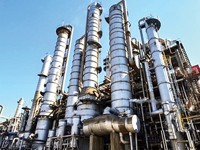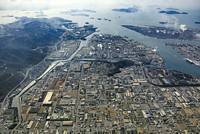Advertisement
Grab your lab coat. Let's get started
Welcome!
Welcome!
Create an account below to get 6 C&EN articles per month, receive newsletters and more - all free.
It seems this is your first time logging in online. Please enter the following information to continue.
As an ACS member you automatically get access to this site. All we need is few more details to create your reading experience.
Not you? Sign in with a different account.
Not you? Sign in with a different account.
ERROR 1
ERROR 1
ERROR 2
ERROR 2
ERROR 2
ERROR 2
ERROR 2
Password and Confirm password must match.
If you have an ACS member number, please enter it here so we can link this account to your membership. (optional)
ERROR 2
ACS values your privacy. By submitting your information, you are gaining access to C&EN and subscribing to our weekly newsletter. We use the information you provide to make your reading experience better, and we will never sell your data to third party members.
Business
Japan Confronts Industry Decline
Business: Hampered by high costs, chemical firms close plants
by Jean-François Tremblay
February 11, 2013
| A version of this story appeared in
Volume 91, Issue 6

Facing chronically poor conditions in their home market, major Japanese chemical producers are downsizing. Near Tokyo, Sumitomo Chemical will shut down an aging ethylene cracker that feeds several plants downstream. Separately, Ube Industries will dismantle a plant near Osaka producing caprolactam, a key material for making nylon.
The moves are taking place at a time when demand in Japan is weak and companies face competition from lower-cost players in the Middle East and the U.S. Only a few months ago, Japan’s largest chemical company, Mitsubishi Chemical, cited deteriorating business conditions when it announced it would close one of its ethylene crackers in Kashima, Ibaraki prefecture, an industrial city a few hours’ drive northeast of Tokyo.
The Sumitomo cracker by itself represents only 6% of Japan’s total ethylene production capacity, says Yoshihiro Azuma, a stock analyst who covers the Japanese chemical sector for the investment firm Jefferies & Co. “But if you add the reduction in capacity at Mitsubishi, it’s significant, and it will reduce Japanese chemical exports.”
Ethylene—a key building block for a wide range of chemicals—is more expensive in Japan than anywhere in the world, Azuma notes. But despite this, Japan has remained a major chemicals exporter. In 2012, the country exported $52 billion worth of organic chemicals and plastics, according to the Japan Chemical Exporters & Importers Association.
Sumitomo is shuttering the 415,000-metric-ton-per-year ethylene cracker at its main Japanese petrochemical plant, in Ichihara, Chiba prefecture. To feed facilities that will remain operating after the 43-year-old cracker closes, Sumitomo plans to source more raw material from Keiyo Ethylene, a multiparty production venture in which Sumitomo owns a 22.5% stake. In tandem with Sumitomo’s closure announcement, Mitsui Chemicals says it plans to divest its own 22.5% stake in Keiyo.
Meanwhile, in Sakai near Osaka, Ube Industries will take apart its 100,000-metric-ton caprolactam plant and associated facilities producing ammonia, liquefied carbon dioxide, ammonium sulfate, and 1,6-hexanediol. In a research note, Azuma called Ube’s move “a very fast and brave decision” considering the likelihood that global caprolactam demand may rebound soon.
Ube and Sumitomo operate larger, newer, and more efficient plants outside Japan. Ube produces caprolactam at a plant in Thailand where it expanded capacity by 20,000 metric tons in December 2011. Sumitomo is co-owner with Saudi Aramco of a major integrated oil refinery and petrochemical complex in Saudi Arabia. The cost of feedstock for that venture’s 1.3 million-metric-ton ethylene cracker is a mere 3% of the cost in Japan, according to a Sumitomo spokesman.
The closure announcements at Sumitomo and Ube coincided with the release of Japanese chemical company earnings for the first nine months of the fiscal year, which ends on March 31. Sumitomo reported a net loss of $435 million, partly owing to negative margins in its petrochemical segment. Mitsubishi managed to remain just barely profitable, but it too suffered losses in its polymers and chemicals segments. At Ube, net income fell 35%; gross margins in its chemicals and plastics segment plummeted 78%.
It will take some time for Ube and Sumitomo to benefit from their cost-reduction efforts. Ube will show a $135 million loss from its move in the current fiscal year but continue to produce caprolactam in Japan until March 2014. Sumitomo’s payoff will be even longer in coming. The firm does not plan to close its Chiba cracker until 2015. In the meantime, the company says it will ponder whether to close other chemical plants at the Chiba complex.




Join the conversation
Contact the reporter
Submit a Letter to the Editor for publication
Engage with us on Twitter